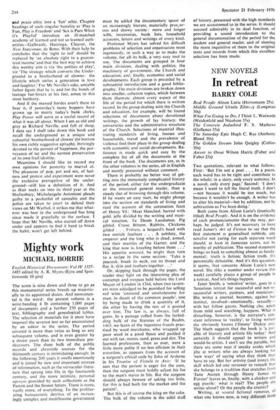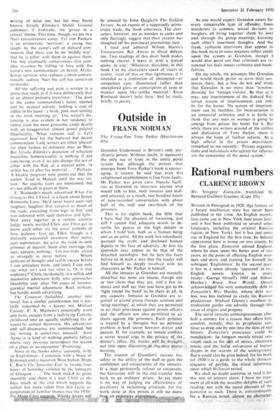NEW NOVELS
In retreat
BARRY COLE
Real People Alison Lurie (Heinemann 25s) Middle Ground Ursula Zilins4 (Longman 30s) What I'm Going to Do, I Think L. Woiwode (Weidenfeld and Nicolson 35s) The Concrete Judasbird F. X. Mathews (Gollancz 35s) The Saturday Epic Hugh C. Rae (Anthony Blond 30s) The Golden Stream John Quigley (Collins 30s) Ascent to Omai Wilson Harris (Faber and Faber 25s) Two quotations, relevant to what follows. First: 'But I'm not a poet . . . In a poem, each word has to be right and contribute to the whole; in a story, only every sentence. In a novel, only every page.' Second: 'I don't mean I want to tell the literal truth. I don't —not because it would be too much, but because it wouldn't be enough. A writer has to alter his material—but by addition, not by subtraction as I've been doing.'
Both come from Alison Lurie's (ironically titled) Real People. And it is on the evidence of each pronunciamento that she may, per- haps, be judged. It's not necessary to have read James's Art of Fiction to see that the first statement is generalised rubbish; any novelist not caring for each separate word should, at least in Jamesian terms, not be worthy of publication. The second statement brings us back to something almost as funda- mental: truth is fiction; fiction truth. It's perennially debatable. And it's this question, it seems, that concerns Alison Lurie's new novel. She (like a number under review this week) carefully places a group of people in a retreat. And lets things happen.
Janet Smith, a 'sensitive' writer, goes to a 'luxurious retreat for successful and not-so- successful writers, painters, and musicians.' She writes a journal, becomes, against her instinct, involved—emotionally, sexually— with her fellow guests. Nothing else, apart from mild soul searching, happens. What is disturbing, however, is the narrator's con- stant reference to 'reality', to living writers she obviously knows ('Jimmy' Dickey etc). The blurb suggests that the book is 'a par- able of literary and artistic life today.' And certainly it should appeal to writers and would-be-artists. I can't see the parable, but there are some neat if sneaky asides which jibe at writers who are always looking for 'new ways' of saying what they think they have to say. But her artistry (and irony), the skill which led one reviewer to remark that she belongs to a tradition that stretches from 'Jane Austen through Henry James to Forster' leaves us, finally, with a chicken and egg puzzle: what is real? The people she writes about? Or the people she creates?
Writing, at several fictional removes, of what one knows now, is very different from
writing of what one has (or may have) known. Ursula Zilinsky's Middle Ground continues. if ironically, the 'group in a retreat' theme. This time, though, we are in a Nazi concentration camp. Tyl von Pankow is an aristocratic 'survivor', a young boy taught by the camp's cell of diehard com- munists that there can be no 'middle way', that he is either with them or against them. The boy eventually compromises (for com- plex reasons) by falling in love with the camp's new commandant, an heroic Afrika Korps survivor who replaces a more conven- tionally sadistic Nazi the cell has contrived to murder.
All the suffering and pain is written in a prose that reads as if it were deliberately that of an almost pedantic translator: 'The door to the camp commandant's house opened and he stepped outside, holding a cup of coffee in his hand: a brisk, pink man smiling in the brisk morning air.' The writer's dis- tancing is also evident in her tendency to imbue even the most gruesome camp deaths with an exaggerated, almost grand guignol theatricality. What remains real is Tyl's equivocal love for the battered but decent commandant. Lady writers are often 'abused' for their failure to delineate man as Man. But Ursula Zilinsky's depiction of reluctant masculine homosexuality is nothing if not convincing, even if we can change the sex of either with the flick of a mental wrist. 'A writer has to alter his material ...' Perhaps. A bleakly poignant note points out that the author 'lived in Munich until she was six- teen.' No specific years are mentioned, but it's not difficult to guess at them.
L. Woiwode's much advertised What I'm Going to Do. I Think, is a book about Soppy Romantic Love. 'He'd never heard such rich laughter, laughter that covered so much of the scale, cascading from high to low, and was coloured with such darkness and light.' Shut away together in a remote country lodge, newly wedded Chris and Ellen get to know each other via the usual patterns of love, jealousy, fear. etc. Ellen. though, is a distinctly successful invention. Part naive, part sophisticate. she gives the book its only glimmer of interest. Soon after marriage she says, apropos nothing: 'I'm morbidly afraid as strangely as never before . . . Whole patterns of thought and reality escape before I can articulate them, and lately I can only say what isn't and not what is. Or is that sophistry?' Chris, incidentally, is a selfish and insensitive adolescent bully who approaches likeability only after 300 pages of inconse- quential marital adjustment. Real, perhaps, but hardly worth advertising.
The Concrete ludasbird, another first novel, has a similar pointlessness but is par- tially redeemed by a keener wit. Michael
Cassidy. F. X. Mathews's potentially worn anti-hero, escapes from a stultifying Catholic childhood into an equally stultifying life of would-be surreal bizarrerie. His adventures and self-discoveries are commonplace but the writing is sometimes unusual: Aunt
Agnes is 'a kind of .walking iDathetic fallacy - ,,whose. very presence deternijned the season cof a place or an encounter.' Promising.
None of the books above, curiously, is by an Englishman: I conclude with a brace of Scotsman and a maverick West Indian. Hugh C. Rae's The Saturday Epic is 'twenty-four
hours of Saturday violence by the teenagers
of Glasgow . . .' The book maket its point smoothly and there is a neat Child of the lag° touch at the end which suggests the author has more talent than this facile re- gurgitation of familiar themes (see the 1930s' be amused by John Quigley's The Golden Stream. As an exposé of a supposedly aristo- cratic trade, the book convinces. The char- acters, however, are as wooden as casks and only fleetingly suggest that their creator has sloughed off his provincial journalistic past.
I read and admired Wilson Harris's Tumatumari. But Ascent to Omai defeats me. Two readings of this short book makes nothing clearer. I leave it. with a typical quote, to you: 'Wherever, therefore, in this book I or my characters speak of vicars of reality, vicar of this or that lighthouse, it is intended as a confession of abstinence—of scrupulous care, illuminated rather than unexplored gloss or conscription of taste or manner upon like/unlike material.' " Even Rimbaud doesn't help, here. And he stuck, briefly, to poetry.



































 Previous page
Previous page